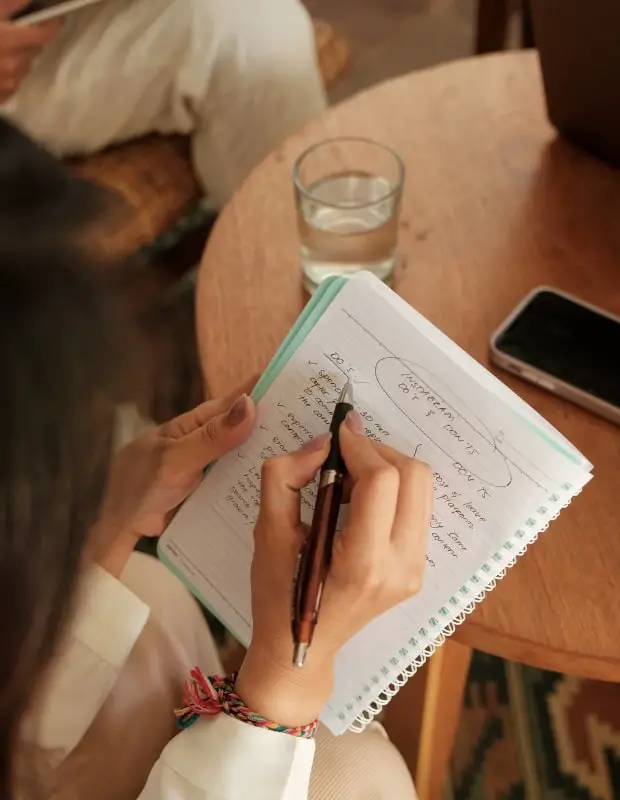
Are you struggling with creativity in your writing career? The good news is that there are many things you can do to get the fountain of ideas flowing again.
Being able to write more creatively will open new avenues for you as a professional writer and propel your craft to greater heights as you develop new faculties of creative thinking. In this article, we’ll explore the benefits of writing more creatively and give you some tips on how to do it effectively. So if you’re ready to jump-start your idea factory, read on!
The Benefits of Infusing Your Writing With Creativity
Whether you’re writing a short story, a science fiction novel, or a personal essay, it’s easy to get stuck in a writing rut. That’s especially true if you feel you’ve been churning out the same old type of content for a while. If your goal is to write more creatively, several benefits come with infusing imaginativeness into your work. Here are four reasons why it’s worth making an effort to add some creative flair to your writing:
1. Creativity Makes Your Writing More Vivid
If you want people to enjoy reading what you write, it needs to be engaging and attention-grabbing from start to finish. Adding a touch of creativity will help you become a better writer and make your work more mentally appealing. It will allow you to develop your unique voice and share your perspective in your own words, without limitations. Your ingenuity will enable you to express how you feel about the worlds inside and outside your head. When readers see that you’ve put thought and care into making something original, they’ll appreciate it all the more.
2. It Can Make You a More Successful Writer and Stand Out from the Competition
In today’s digital world, there is so much content available that it’s easy to fall into writer’s block. There’s simply a lot of competition in the literary world, especially now, when a typical writing process includes the use of artificial intelligence. You need to dig deep into your own experience and your surroundings. Be inspired by real people, real emotions, and real events. You don’t need fancy writing prompts or literary devices. To get into a creative flow, reflect on your journey as a human being, including the small moments that permanently burned themselves into your memory. Let those reflections guide the philosophy that underpins your writing. If everyone else subconsciously wants to blend in, being creative will give you an edge. Uniqueness always catches people’s eye.

3. Open-Mindedness Toward Feedback Helps Improve Your Future Pieces
Accepting feedback can be a great way to help you reach your creative writing goals. Like pieces of a puzzle, the more feedback you receive, the clearer the picture will get. If you shut down or become defensive when people try to approach you, you are more likely to miss out on opportunities to improve and excel in your craft. Never view constructive criticism as a bad thing because it aims to help improve your performance on whatever project you’re undertaking. That’s why you should always test your creative writing techniques in writing workshops and through various writing exercises (more on that below!)
4. Practice Brainstorming Different Ways and Think Outside the Box
This helps with approaching future assignments from a unique point of view. Brainstorming lets your new ideas flourish, so you can become a creative writer. There are dozens of effective brainstorming techniques you can employ, such as storyboarding, mind mapping, S.W.O.T. analysis, and many others. Allow each member of your peer group to share knowledge and ideas, and be involved in developing a plan, delegating, and efficiently tackling problem areas. Adding an element of creativity to your first draft enhances the process itself and the result. This applies whether you’re crafting a fresh blog post or considering the correct word choice for a series of graphic novels. I hope these tips helped encourage you to try something different next time you sit down at the keyboard. Key takeaway: Injecting creativity into your writing makes it more engaging and successful.
Effective Ways to Be More Creative as a Writer
Creativity is often considered a trait that some people are born with. Either you have it or you don’t. However, everyone can become creative with ample practice. If you’re stuck in a writing rut or wonder how to infuse a creative spirit into your academic writing, here are four effective ways to get your creative juices flowing:
1. Take on Different Writing Challenges
Trying new things is a great way to stimulate creativity. So, if you normally write short stories, why not try your hand at poetry or personal essays? Or if you typically stick to non-fiction, branch out and try fiction for a while. By pushing yourself outside of your comfort zone, you’ll open yourself up to new possibilities and ways of writing creatively.
2. Collaborate with Someone on a Writing Project
Collaborating with another person can jumpstart the brainstorming process and help generate the next great idea. Whether it’s recording ideas over coffee or trading email drafts back and forth, working with someone else will help take your thinking (and writing) to the next level. The Beatles’ John Lennon and Paul McCartney are probably the most successful songwriting tandem in history. By collaborating on unique ideas, they fed off each other’s intelligence, energy, and creativity, resulting in a huge number of hit songs.

3. Keep a Journal (Traditional or Digital)
A journal doesn’t have to be anything fancy. Simply jotting down stream-of-consciousness thoughts can lead to unexpected insights about characters or plotlines. When you keep a journal going and log ideas, you will process information in more creative ways. This will help you with sparking new ideas and you can always go back to older pages, which can ignite even more ideas that’ll allow you to add more emotion to the whole story. Plus, having all of your thoughts in one place makes it easy to refer back later when you need inspiration.
4. Write Down Your Ideas As Soon As They Come
This may seem like common sense, but capturing those “Eureka!” moments is essential for being creative and developing powerful main characters. As soon as an idea pops into your head, grab a pen and paper (or open up a simple notes app on your phone) so you don’t forget what inspired you. For aspiring authors, even one page of notes can spark your creativity and lead to a great book idea. I remember a scene in the now-defunct TV series Two and a Half Men, where Charlie Sheen was waiting to use the restroom. Then out came from the door Eddie Van Halen with a guitar slung on his shoulder. When Charlie asked him why he carries a guitar in there, the rock legend replied “You’ll never know when an inspiration may strike” before playing an outstanding riff. That’s how a blank journal mentioned above comes in handy for writers. It can help to ignite your imagination as it allows you to brainstorm in many forms. By following these four tips, you’ll be well on your way to writing something genuinely creative. Key takeaway: To be more creative, try new challenges, brainstorm with other writers, keep a journal, and write down your ideas.
Why You Should Write More Creatively
We all know that writing can be therapeutic. It’s a great way to express ourselves and get our thoughts out there. But did you know that writing can also be fun? And by “fun,” I don’t mean just the act of putting words on paper (or screen). I’m talking about letting your creative juices flow and coming up with new, innovative ways to express yourself. If you’re not a naturally creative person, you might be thinking, “Why should I write more creatively? What’s the point?” Well, here are four reasons channeling your inner Stephen King or Margaret Atwood is a great idea:
1. It’s Enjoyable
When you let your creativity shine through in your writing, it becomes much more than just a task or chore. It becomes something you enjoy doing. The process is less daunting and even exciting when coming up with fresh ideas and ways to communicate them effectively. So go ahead, have some fun with it. By training your creativity muscle, you’ll build your character and embark on your new creative nonfiction project with flair. Think about it like a puzzle. How would you approach the dialogue, the main character, and the overall story to push everything in the right direction? Let the muse whisper into your ear. That’s how you come up with good writing!
2. Your Readers Will Appreciate It
Let’s face it, no one wants to read dull or unoriginal content. If you want your anonymous readers or a real-life friend to enjoy reading what you’ve written, put some extra thought into making it engaging and stimulating from start to finish. Make your mental space wide open to approach your fiction or creative nonfiction from a new point of view.

3. It Helps Hone Your Craftsmanship as a Writer
By continually challenging yourself creatively, chances are good you’ll see improvements in other areas of writing as well. Now it’s not only about developing your main story but also about overcoming writer’s block and writing more consistently. Remember – practice makes perfect!
4. You May Just Surprise Yourself
Creativity often breeds originality, and that’s something that we could all use a little more of in our lives these days. If you ever considered creative writing as a profession, why wouldn’t you want to come up with something that makes you sweat with excitement? Who knows? Maybe you’ll come up with the next big thing! Key Takeaway: Making an effort to write more creatively can be therapeutic, and fun, and may even surprise you with your originality.
Teach Others How to Improve Creative Writing Skills
When mentoring others, you are inadvertently improving your skills. Whether it be writing, painting, acting, storytelling, or any other discipline. Assuming the reader has little to no creative writing experience, explain what creative writing is and why it’s important. Use simple words and short sentences. Define any technical terms you use. Then, provide several tips on improving one’s creative writing skills, such as reading often, practicing regularly, expanding one’s vocabulary, listening to music for inspiration, etc. Give specific examples of how the tips you provided help improve one’s innovativeness in writing. Finally, encourage the reader to keep practicing and remind them that everyone’s journey with creative writing is different.
FAQs on How to Write More Creatively:
1. How can I be better at creative writing?
There is no easy answer to this question. However, here are some tips that may help you write more creatively:
a) Let Go of Your Inner Critic.
Allow yourself to write freely without worrying about whether it is good enough. The first step to writing anything creative is simply getting the ideas down on paper (or screen). Worrying about perfection will only hinder your creativity and prevent you from producing anything at all.
b) Be Open to New Ideas and Possibilities.
When you approach writing with an open mind, you will be more likely to come up with original and creative ideas. If you find yourself getting stuck, try brainstorming, using writing prompts, or free-writing for a few minutes to see what comes up. Remember that it’s much easier to keep writing than getting down to writing in the first place.
c) Take Inspiration from the World Around You.
Look for everyday objects or situations that can inspire your writing. Maybe there’s something strange about the way the light hits a building at sunset, or maybe there’s a fascinating character in line at the coffee shop who would make a great protagonist in your short story. Keeping your eyes peeled for these kinds of details can help jumpstart your creativity when you need it the most.
d) Experiment with Different Genres and Styles.
If you usually write fiction, try writing poetry, personal essays, or nonfiction for a change. Or if you’re used to writing short stories, try your hand at a novel. You can also try business writing. Trying out new genres can help break you out of any ruts you may have fallen into and give you fresh ideas for approaching your usual type of writing.
e) Get Feedback from Others—But Don’t Let It Stifle Your Creativity.
Show your work to friends or family members and ask for their honest opinion. But remember that ultimately it is up to you what changes (if any) to make based on their feedback. After all, you’re the creative writer here. Don’t let anyone else completely take over the reins!
2. How can I make creative writing more interesting?
- Make a list of interesting projects that could benefit from your creative writing skills.
- Get a notebook or journal and start brainstorming ideas for new stories, characters, or settings.
- Take a walk and think about your favorite books, movies, or TV shows, then try to come up with something even better.
- Join a writers’ group so you can share your work with other people who are also interested in making their writing more interesting and enjoyable.
- Read books on writing crafts and techniques. There are plenty of great ones out there to help you hone your skills.
- Practice, practice, practice!
The more you write, the better you’ll become at making your work interesting and engaging for both yourself and your readers.
3. How can I learn to write creatively?
The best way to learn how to write creatively is by studying the work of other creative writers. Pay attention to their use of language, plotting, and characterization. As you read and analyze their work, take note of what techniques you find most effective and try incorporating them into your writing. It’s also important to give yourself time and space to explore your creativity freely, without worry or judgment. Allow yourself the freedom to experiment with different styles and ideas until you find a voice that feels authentically yours. Finally, don’t forget that practice makes perfect. The more you write, the better (and more creative) a writer you’ll become!
Conclusion
The takeaway from this article is that writing more creatively can have many benefits, both for the writer and the reader. If you’re struggling with creativity, don’t despair. There are plenty of ways to get those gears inside your head turning again. So what are you waiting for? Start writing! If you want to learn how to write more creatively, boost your productivity as a writer, or simply improve your creative writing skills, then look no further! I offer freelance writing services that can help you with these things and more. Contact me today to get started on making your writing goals a reality. Next up, you may want to explore a guide to location-independent writing.
Get your free PDF report: Download your guide to 80+ AI marketing tools and learn how to thrive as a marketer in the digital era.
Hey there, welcome to my blog! I'm a full-time entrepreneur building two companies, a digital marketer, and a content creator with 10+ years of experience. I started RafalReyzer.com to provide you with great tools and strategies you can use to become a proficient digital marketer and achieve freedom through online creativity. My site is a one-stop shop for digital marketers, and content enthusiasts who want to be independent, earn more money, and create beautiful things. Explore my journey here, and don't miss out on my AI Marketing Mastery online course.


